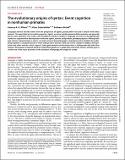Files in this item
The evolutionary origins of syntax : event cognition in nonhuman primates
Item metadata
| dc.contributor.author | Wilson, Vanessa A D | |
| dc.contributor.author | Zuberbühler, Klaus | |
| dc.contributor.author | Bickel, Balthasar | |
| dc.date.accessioned | 2022-07-08T11:30:18Z | |
| dc.date.available | 2022-07-08T11:30:18Z | |
| dc.date.issued | 2022-06-24 | |
| dc.identifier | 280300097 | |
| dc.identifier | acfdaf1e-1376-422e-84f7-2df9c5dfe326 | |
| dc.identifier | 35731868 | |
| dc.identifier | 85131062463 | |
| dc.identifier | 000814518800013 | |
| dc.identifier.citation | Wilson , V A D , Zuberbühler , K & Bickel , B 2022 , ' The evolutionary origins of syntax : event cognition in nonhuman primates ' , Science Advances , vol. 8 , no. 25 , eabn8464 . https://doi.org/10.1126/sciadv.abn8464 | en |
| dc.identifier.issn | 2375-2548 | |
| dc.identifier.uri | https://hdl.handle.net/10023/25636 | |
| dc.description | Funding: This research received funding from a Swiss National Science Foundation Project grant 310030_185324 (K.Z.) and the NCCR Evolving Language, Swiss National Science Foundation Agreement #51NF40_180888 (B.B. and K.Z.). | en |
| dc.description.abstract | Languages tend to encode events from the perspective of agents, placing them first and in simpler forms than patients. This agent bias is mirrored by cognition: Agents are more quickly recognized than patients and generally attract more attention. This leads to the hypothesis that key aspects of language structure are fundamentally rooted in a cognition that decomposes events into agents, actions, and patients, privileging agents. Although this type of event representation is almost certainly universal across languages, it remains unclear whether the underlying cognition is uniquely human or more widespread in animals. Here, we review a range of evidence from primates and other animals, which suggests that agent-based event decomposition is phylogenetically older than humans. We propose a research program to test this hypothesis in great apes and human infants, with the goal to resolve one of the major questions in the evolution of language, the origins of syntax. | |
| dc.format.extent | 12 | |
| dc.format.extent | 279842 | |
| dc.language.iso | eng | |
| dc.relation.ispartof | Science Advances | en |
| dc.subject | Animals | en |
| dc.subject | Biological Evolution | en |
| dc.subject | Cognition | en |
| dc.subject | Hominidae | en |
| dc.subject | Humans | en |
| dc.subject | Language | en |
| dc.subject | Primates | en |
| dc.subject | BF Psychology | en |
| dc.subject.lcc | BF | en |
| dc.title | The evolutionary origins of syntax : event cognition in nonhuman primates | en |
| dc.type | Journal item | en |
| dc.contributor.institution | University of St Andrews. School of Psychology and Neuroscience | en |
| dc.contributor.institution | University of St Andrews. Institute of Behavioural and Neural Sciences | en |
| dc.contributor.institution | University of St Andrews. Centre for Social Learning & Cognitive Evolution | en |
| dc.identifier.doi | https://doi.org/10.1126/sciadv.abn8464 | |
| dc.description.status | Peer reviewed | en |
This item appears in the following Collection(s)
Items in the St Andrews Research Repository are protected by copyright, with all rights reserved, unless otherwise indicated.

